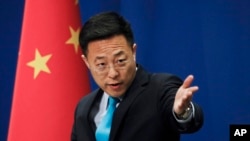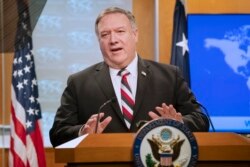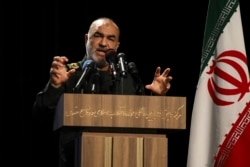Iran and China have been amplifying each other’s allegations that the United States initiated the coronavirus pandemic.
Both countries have used their state-approved media to highlight shared narratives rejected as false by Washington.
In recent weeks, Iranian state media have unquestioningly promoted claims from Chinese official and media sources that the U.S. brought the virus to China, where it was first detected in December before developing into a global pandemic.
Chinese state media have done the same with Iranian officials’ accusations that the U.S. created the virus to use as a biological weapon against Iran and other adversaries.
Iran and China are longtime economic allies and rivals of the U.S.
“Iran and China typically have very anti-U.S. sentiments in their state media,” Rachel Chernaskey, a media analyst for the Philadelphia-based Foreign Policy Research Institute, said in a VOA Persian interview. “Where they have certain media narratives that are favorable (to each other’s point of view), you’ll see an overlap between them.”
Chinese Foreign Ministry spokesman Lijian Zhao has been Beijing’s most outspoken proponent of an unproven allegation that U.S. military personnel somehow brought the virus to Wuhan, center of China’s outbreak.
Zhao’s allegation, made in a March 12 tweet, received wide coverage by Iranian state-approved news sites in the following days. The coverage included articles by IRNA, PressTV, Tasnim, Javan Online, Hamshahri Online and Islamic Azad News Agency.
U.S. Secretary of State Mike Pompeo protested the Chinese allegation in a March 16 phone call with Chinese Politburo member Yang Jiechi.
The State Department said Pompeo “conveyed strong U.S. objections to (China’s) efforts to shift blame for COVID-19 to the United States (and) stressed that this is not the time to spread disinformation and outlandish rumors, but rather a time for all nations to come together to fight this common threat.”
Beijing’s state-run China Global Television Network (CGTN) later re-posted a conspiratorial opinion piece by a Chinese engineer working for a Hubei province-based railway company, titled “10 questions for the U.S.: Where did the novel coronavirus come from?”
In the March 19 post, which CGTN said originally came from engineer Wang Fuhua’s WeChat account where he comments on engineering issues and world affairs, Wang asks whether U.S. military, intelligence and health personnel covered up supposed coronavirus-related developments on U.S. soil last year.
A Canada-based conspiracy theory website, GlobalResearch.ca, republished the CGTN post on March 21, prompting the Iranian government to highlight it two days later through IRNA, its official news agency. IRNA quoted a tweet by Iran’s Foreign Ministry saying the U.S. “must answer” the unsubstantiated allegations raised in the article.
Iranian officials have made even more strident accusations of U.S. responsibility for the pandemic, going so far as to accuse the U.S. of creating the virus as a biological weapon.
Hossein Salami, head of Iran’s most powerful military force, the Islamic Revolutionary Guard Corps, was the first prominent Iranian official to make the allegation. In a March 5 report by Iran’s semiofficial ISNA news agency, Salami was quoted as saying, "We will prevail in the fight against this virus, which might be the product of an American biological (attack), which first spread in China and then to the rest of the world.”
Iranian Supreme Leader Ayatollah Ali Khamenei posted a March 13 tweet saying there was “evidence that suggests the likelihood of this being a biological attack.” He went further in a March 22 televised speech, addressing the U.S. by saying, “You are accused of having created this virus. I do not know how accurate this claim is, but considering the circumstances that exist, which reasonable individual can trust you?”
A combination of Chinese state news agencies and prominent state-approved news bloggers gave uncritical coverage to the Iranian allegations.
Salami’s accusation was cited by state-run newspaper China Daily, a blogger with the handle “Changan commenting on military affairs,” whose articles on China’s Sohu platform have 31 million views, and a blog by Chengdu-based internet company Shanglongze on China’s Baidu platform.
Khamenei’s reference to the U.S. allegedly creating the virus was quoted in reports by Pengpai News, a unit of state-run Shanghai Media Group, and by Observer, a news outlet affiliated to the Shanghai Federation of Social Science Associations.
The U.S. State Department rebuked Khamenei and Salami in a March 23 statement.
“(Iranian) regime officials make false claims that the U.S. engineered the virus — focusing their time and resources attempting to deflect blame instead of taking responsibility and providing for the health, prosperity and rights of Iranians, who deserve far better,” it said.
This article originated in VOA’s Persian Service, in collaboration with VOA’s Mandarin Service and Extremism Watch Desk.












